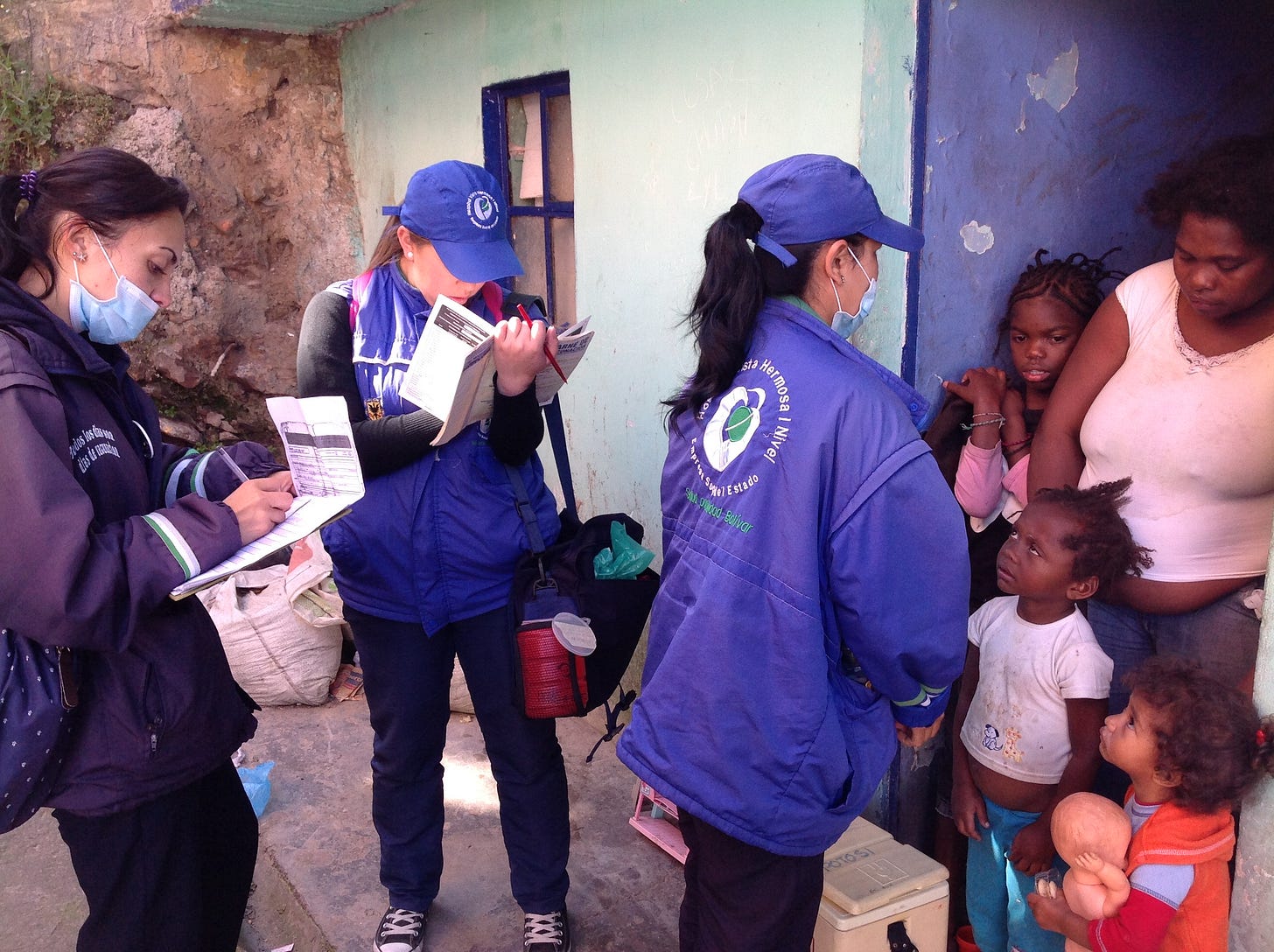Oh Canada! You Just Cost the Americas Its Coveted Measles-Free Status
After a year of outbreaks Canada has cost the Americas measles-free status - a preventable reversal fueled by vaccine hesitancy & disinformation. "Put simply an extremely sad day for public health"

World Briefing Summary:
The Americas has lost its prized measles elimination status, the Pan American Health Organization confirmed, after more than a year of sustained outbreaks in Canada. The setback means the entire region — from the Canadian Arctic to Argentina — can no longer claim to be measles-free.
Put simply - it is an extremely sad day for public health.
As of early November, more than 12,500 confirmed cases have been reported across ten countries — a 30-fold increase from last year. The virus has spread mostly among under-vaccinated communities, with almost nine in ten patients unvaccinated or uncertain of their vaccination status. Active outbreaks are ongoing in Canada, Mexico, the United States, Bolivia, Brazil, Paraguay, and Belize, mostly triggered by imported cases.
PAHO Director Dr. Jarbas Barbosa called the loss “a setback — but a reversible one,” urging governments to recommit to vaccination drives. The U.S. could soon follow Canada’s path, experts warn, as vaccine misinformation and complacency spread faster than the virus itself.
Measles is highly contagious. A single infected person can transmit it to up to 18 others.
I witnessed polio and measles vaccination drives up close. During my years with the World Health Organization, PAHO, and UNICEF, I worked alongside extraordinary teams across the Americas — as well as in Africa, Palestine, Pakistan, and Ukraine. But the Americas showed the most remarkable progress: the first region in the world to eliminate the measles virus, twice. It took a Herculean effort — from First Ladies launching national campaigns to volunteer health workers in the shantytowns of Venezuela, Mexico, and Colombia. It was a region-wide movement built on trust, access, political will and relentless determination. To see that collective achievement now at risk is profoundly disheartening. These diseases are preventable - yet they still kill children and leave others with irreversible harm.
Why it matters:
A continent that once eradicated measles is learning an uncomfortable lesson: in the age of disinformation, immunity can’t be taken for granted.
The Americas has lost its measles elimination status, the Pan American Health Organization said. It happened after more than 12 months of sustained outbreaks in Canada - which costed the entire Americas region from the Canadian north all the way down to the southern reaches of Argentina - the coveted status of being measles free. Because Canada is no longer deemed measles-free, the Americas region as a whole has lost its elimination status, although individually the other countries are still considered to have stamped out the disease. Experts fear the U.S. could soon face the same fate as vaccine misinformation fuels the virus’ spread - NPR/BBC
As of Nov 7, 12,593 confirmed measles cases have been reported across ten countries in the Americas (approximately 95% of cases in Canada, Mexico and US), a 30-fold increase compared to 2024. PAHO said 28 deaths have been recorded: 23 in Mexico, 3 in the United States, and 2 in Canada. Active outbreaks are ongoing in Canada, Mexico, the United States, Bolivia, Brazil, Paraguay, and Belize, mostly triggered by imported cases. Transmission has primarily affected under-vaccinated communities, with 89% of cases occurring in unvaccinated individuals or those with unknown vaccination status.
“This loss represents a setback—but it is also reversible. Until measles is eliminated worldwide, our Region will continue to face the risk of reintroduction and spread of the virus among unvaccinated or under-vaccinated populations. However, as we have demonstrated before, with political commitment, regional cooperation, and sustained vaccination, the Region can once again interrupt transmission and reclaim this collective achievement” - Dr. Jarbas Barbosa, Director of PAHO.
Thailand’s army said on Tuesday (Nov 11) “hostilities still remain” with Cambodia, a day after Bangkok suspended the implementation of a US-backed peace deal over a landmine blast that wounded four troops. The deal, brokered by US President Donald Trump in October, was meant to wind down a conflict that peaked with five days of clashes in July that killed at least 43 people and displaced about 300,000 civilians on both sides. Both sides agreed under the pact to withdraw heavy weapons from the border region and to give access to ceasefire monitors. Thailand also pledged to return 18 captured Cambodian troops. Cambodia said the situation on the border “remains calm”. However, Thailand’s response suggested that tensions have returned with the suspension of the pact’s implementation. “The truth has become clear that hostilities still remain,” Royal Thai Army (RTA) chief Pana Klaewblaudtuk said in a statement. “The Thai Army needs to suspend the joint declaration to safeguard our right to self-defence,” it said, referring to the pact. Thailand has often accused Cambodia of laying new landmines along their border in breach of the Ottawa Convention banning anti-personnel mines. The RTA said four soldiers were wounded by Monday’s landmine blast in Sisaket province - CNA
A de facto partition of Gaza between an area controlled by Israel and another ruled by Hamas is increasingly likely, multiple sources said, with efforts to advance U.S. President Donald Trump’s plan to end the war beyond a ceasefire faltering. Six European officials with direct knowledge of the efforts to implement the next phase of the plan told Reuters it was effectively stalled and that reconstruction now appeared likely to be limited to the Israel-controlled area. That could lead to years of separation, they warned. Under the first stage of the plan, which took effect on October 10, the Israeli military currently controls 53% of the Mediterranean territory, including much of its farmland, along with Rafah in the south, parts of Gaza City and other urban areas. Nearly all Gaza’s 2 million people are crammed into tent camps and the rubble of shattered cities across the rest of Gaza, which is under Hamas control - Reuters
The UN has said that Israeli restrictions continue to block the flow of humanitarian aid into besieged Gaza, a month after the ceasefire took effect. Citing the Office for the Coordination of Humanitarian Affairs (OCHA), UN spokesperson Farhan Haq said on Monday at a news conference that “one month into the ceasefire, efforts to ramp up aid are still being held back by red tape, ongoing bans on key humanitarian partners, too few crossings and routes, and insecurity that persists despite the ceasefire….In some areas, our teams still have to coordinate every movement in advance with the Israeli authorities,” he said, adding that Israel facilitated only two out of eight aid attempts entirely and “four were impeded on the ground — including one that was delayed for 10 hours before the team finally received a green light to move.” Haq said the UN and its partners are “seizing every opportunity to expand operations” despite the continuing challenges - TRT
An investigation into the alleged Nord Stream saboteurs is threatening to fracture Europe’s support for Ukraine. German authorities have built a case implicating an elite Ukrainian unit in the 2022 pipeline explosions, opening diplomatic and political fissures. Poland refused to extradite one suspect, calling him a “hero” and criticizing Berlin’s past purchases of Russian gas, while Germany’s far-right opposition politicians have seized on high energy prices and the suspects’ nationality to undermine support for Kyiv. “The diplomatic fallout of the bombings might have been easier for Germany to navigate if their detectives hadn’t so effectively built a case against Ukraine,” The Wall Street Journal wrote - Semafor
The European effort to tap frozen Russian assets to keep Ukraine afloat is stalling over Belgian objections, but Slovakia’s leader is reminding the EU that he’s also in line to block the plan. Belgium’s demands for financial guarantees from EU capitals against the loan have become the focal point of the initiative, which would leverage frozen Russian state assets on Belgian soil. Top brass within the European Commission fell short of convincing the Belgian premiership to get on board with the plan on Friday, according to two officials briefed on the talks. Then Slovakia’s prime minister, Robert Fico, chimed in, further complicating the bloc’s drive to fill Kyiv’s war chest before it runs bare in the spring. “Slovakia won’t take part in any legal or financial schemes to seize frozen assets if those funds would be spent on military costs in Ukraine,” Fico told the Slovakian public broadcaster, STVR, on Sunday. Fico’s comments signal the legal challenge the Commission faces to counteract the veto threat that Kremlin-friendly countries in the EU have over Russian sanctions — also a key demand from the Belgians. The Commission is working on a legal loophole to keep the Russian assets on ice until Moscow ends the war and pays war reparations to Ukraine. Without the loophole, Slovakia or Hungary could torpedo the entire initiative when the EU needs to reauthorize its Russian sanctions every six months, sending any sanctions cash back to Moscow - Politico
The BBC is embroiled in a massive political fight over its future, with conservatives capitalizing on an editing screw-up and denouncing the British broadcaster while liberals argue that the institution is flawed but worth defending. On Monday, Trump intensified the pressure by sending a threatening legal letter to the news organization over the misleading edit in a one-year-old documentary about his reelection campaign. He is demanding at least $1 billion in damages. A BBC spokesperson told CNN that “we will review the letter and respond directly in due course.” Trump has sent several legal letters to other news organizations, including CNN, during his second term in office. The president’s legal threats often don’t amount to anything, but he does have pending lawsuits against the Wall Street Journal, The New York Times and the Des Moines Register. Earlier Monday, BBC Chair Samir Shah issued a belated apology for the “error of judgment” with the October 2024 documentary. BBC director-general Tim Davie and BBC News chief Deborah Turness tendered their resignations on Sunday as stories about the edit scandal consumed British media. There is no indication that the misleading edit was politically motivated. Nor is there any reason to believe that Davie and Turness knew about it ahead of time - CNN
Some US data centers are standing empty because of a lack of electricity, highlighting challenges in keeping up with ballooning demand for AI. One California facility, located in Nvidia’s hometown, has been awaiting energization for six years, Bloomberg reported; an energy company estimates large data centers could take up to seven years to come online. “The biggest barrier to progress isn’t money but energy,” an MIT Technology Review reporter noted, arguing the US could learn from China’s energy abundance. The data center explosion has created boom towns across the US, but strained grids and increased housing prices and energy costs. Ironically, The Atlantic wrote, energy constraints could keep the AI boom from “growing too irresponsibly.” - Semafor




